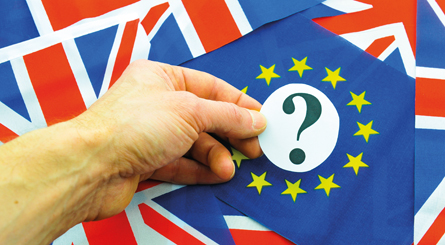No-deal threat to medicines supply remains
In Analysis
Follow this topic
Bookmark
Record learning outcomes

Prime minister Theresa May’s cabinet yesterday (Wednesday November 14) approved a Brexit plan agreed by UK negotiators and the EU, though with a Parliamentary vote still to come, a number of resignations by ministers opposed to the exit plan and talks of a threat to her leadership, there are still hurdles in her way before a deal is secured.
Health secretary Matt Hancock and pharmaceutical industry leaders welcomed the announcement as a step towards ensuring the safe supply of medicines, while a recent survey suggests the public is concerned about the impact a no-deal Brexit will have on UK medicine supplies.
Concerns have been voiced in recent months that a no-deal Brexit would disrupt the pharmaceuticals sector, which is highly regulated and has lengthy supply chains that at present depend on the cooperation of parties in several countries.
Price rises for the NHS and medicine shortages are among the potential negative consequences of leaving Europe without a deal, industry chiefs have warned. The draft agreement sets out the terms of a post-Brexit transition period, which industry figures say is needed to guarantee the supply of medicines in the short term.
A KPMG survey released yesterday finds that 53 per cent of the public believe the UK will leave Europe without a deal and 70 per cent believe this will adversely affect the supply of medicines. In August the Government advised companies to build an additional six weeks’ worth of medicines stockpiles in the event of no deal.
Commenting on the agreement, Mike Thompson, ceo of the Association of the British Pharmaceutical Industry, said: “We welcome this important step towards securing a Brexit deal. Agreeing a transition period will mean that our members can continue to supply medicines to patients without delay or disruption come March 2019.
“There’s much to build on. But there’s more work to be done. We are committed to working with the UK and the EU so that close cooperation on scientific research and medicines regulation are central to a future partnership agreement for the benefit of all.”
The European Federation of Pharmaceutical Industries and Associations voiced scepticism, saying it is “extremely concerning that the withdrawal agreement fails to specifically address the health issues important to patients, their safety and the wider public health."
Health secretary Matt Hancock told the BBC that he supported the draft agreement as a good deal for the UK. He said: “We are working very hard to ensure that people have the unhindered flow and access to medicines that they need. There is a lot of work to do that but I hope that by this deal we can avoid a no-deal Brexit, we can avoid a second referendum and we can have a high quality future with the EU, and that is what this deal provides.”
There are reports Mr Hancock warned cabinet colleagues during yesterday’s meeting that he could not guarantee people would not die due to medicine shortages if the UK leaves Europe without a deal, though he refused to be drawn on this when asked by the BBC.
What’s in the draft agreement?
The draft withdrawal agreement sets out the proposed terms under which the UK will leave the EU on March 29 2018. It includes details of a 21-month transition period and, most controversially, provisions for a ‘backstop’ arrangement whereby the UK will remain in a customs union with the EU until such time as it is possible to leave this without introducing a hard border on the island of Ireland.
While this is not designed to be a permanent arrangement, the terms of the agreement mean neither the UK or tnhe EU may end it unilaterally, which has proved to be a sticking point with those MPs most staunchly in favour of Brexit. There are also concerns that the agreement undermines the integrity of the UK by placing Northern Ireland in a deeper customs arrangement with Europe than England, Scotland and Wales.
Cabinet approved the withdrawal text following five-hour talks yesterday. In an announcement, Ms May said: “When you strip away the detail, this deal delivers on the vote of the referendum, takes back control of our money, our laws and our borders and ends free movement”.
The draft bill must go before Parliament to be voted on. In the wake of resignations such as work and pensions secretary Esther McVey and Brexit secretary Dominic Raab (who said he could not “in good conscience” support Ms May’s deal) on Thursday November 15, there is continued uncertainty around whether it will pass.
